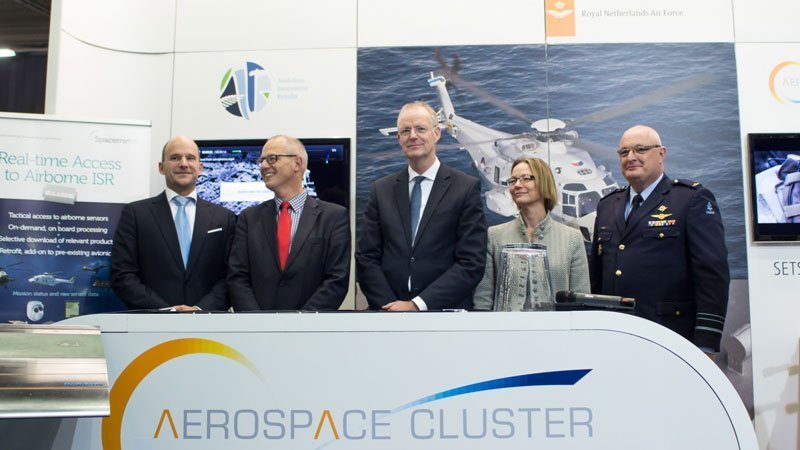More and more civil and military aircraft are built of composite materials. Four Dutch leading parties grabbed the opportunity to share knowledge of repair and maintenance of composites components. Fokker, NLR, Airborne and TU-Delft started a project to create the Development Centre for Maintenance of Composites (DCMC). At the NIDV conference in Rotterdam, the DCMC was established by the founding fathers supported by the Royal Netherlands Air Force. They all underline the importance to keep (aero)structures in operation during deployments and their complete lifecycle. The DCMC will initiate and support innovations in the Maintenance Repair and Overhaul of composite (aero)structures.
The DCMC foundation establishment in AHOY Rotterdam followed a collaboration agreement signing at Le Bourget Air Show in France, in June 2015. The NIDV event at the Aerospace Cluster stand was witnessed by representatives of the Royal Netherlands Airforce, the Dutch Ministry of Defence and Ministry of Economic Affairs.
“Repair and maintenance of composites components in military hardware is important for the Royal Netherlands Air Force (RNLAF) to keep the assets in operation during deployments”, said General Sander Schnitger, commander of the RNLAF. “Another clear proof of the success of the last years founded Aerospace Cluster where the Royal Netherlands Airforce, industry and knowledge centres achieve innovative technological results by cooperation”
Research Bridge
Since 2010 composite materials are widely used in civil (Boeing 787, Airbus A350) and military (NH90, F-35) aircraft which need to be maintained and repaired. This market for maintenance and repair of composite structures is new and will grow fast in the coming decade. Globally it is expected to grow three times as fast as the conventional MRO programmes at a CAGR (compound annual growth rate) of 10.6% (ref. Lucintel). To be successful in this market, technology should be available, procedures in place and personnel educated and well trained.
The Development Centre for Maintenance of Composites will be focussing on the development and testing of new maintenance repair and overhaul products, processes and services for composite (aero) structures. By bringing together knowledge, capabilities and infrastructure a bridge is created between fundamental research performed at institutes and applied technology developed by companies. Projects managed or performed by the DCMC are based on business cases with customers and have a Technology Readiness Level (TRL) between 4 to 6/7.
Maintenance Cluster
The DCMC knowledge and innovation centre will be located at Business Parc Aviolanda, next to the Royal Netherlands Air Force base Woensdrecht. The ambition of the DCMC is to become an international leading and independent authority which initiates and supports the innovations in the Maintenance Repair and Overhaul of composite structures. This is done by guiding the different (inter)national innovation projects and execution of research and development programmes initiated by DCMC members.
Maxime Verhagen – chairman of the steering group aiming for economic benefits from the F-35 sustainment commented “Initiatives like this are important for the Netherlands. Innovation and cooperation in the ‘triple helix’ are main drivers for competitiveness and growth of the Dutch economy. The DCMC is a strong example in the field of composite maintenance where industry, institutes and government create opportunities bringing MRO to the next level”.
The DCMC organisation will be a collaboration between first and second tier companies, OEMs and knowledge institutes, both from The Netherlands and abroad. Initially the centre will focus on the aerospace market, but during the further development spin-offs and spill-over into other markets will occur.
Aerospace cluster
Cooperation is the strength of the Aerospace Cluster. The core of the cluster is formed by the Royal Netherlands Air Force, NLR, Fokker Technologies, Airbus Defence and Space Netherlands and the faculty of Aerospace Engineering at TU Delft. The size and composition of the core team makes the cluster controllable, manageable and long reach. Projects that contribute to innovations in the field of military aerospace derive from the innovation agenda of the Royal Netherlands Air Force. Depending on the subject and the necessary expertise the cluster involves other parties in the projects. The result is the perfect match in terms of cooperation and maximum value for the parties involved and the aerospace industry as a whole. For the Dutch knowledge economy provides the collaboration with educational institutions and industry knowledge great benefits. Collaboration is increasingly becoming the key to success in the current era.
Background companies
Fokker Services: this is an integrated, knowledge based services organisation that partners with manufacturers, owners and operators of aircraft in the continued competitive operation of their fleet by increasing technical dispatch reliability (TDR) and passenger comfort while reducing direct operating cost (DOC). Fokker Services BV is a company of the Fokker Technologies Holding.
NLR: The National Aerospace Centre NLR is the central institute for aerospace research in The Netherlands. NLR is an independent non-profit organisation and one of the Dutch Major Technological Institutes which performs a large part of the applied research each within its own specific technology field.
Airborne Services: Airborne is a company specialised in the design, manufacturing and maintenance of composite aero-structures. The group employs around 250 people and has facilities in The Netherlands and Spain. This particular business unit is active in maintenance and repair of composite structures, with a focus on rotor blades of military and civil helicopters.
www.airborne-services.aero
TU-Delft: The faculty of Aerospace Engineering at Delft University of Technology is one of the world’s largest faculties devoted entirely to aerospace engineering. It is the only research and education institute in the Netherlands engaged in research and teaching that is directly related to the aerospace engineering sector. It covers the whole spectrum of aerospace engineering subjects, and explores vital related fields such as wind energy. The faculty is home to around 2,500 BSc and MSc students, 214 PhD candidates and 27 professors supported by scientific staff.
For more information, please contact Rob Bosgraaf, rob.bosgraaf@fokker.com
